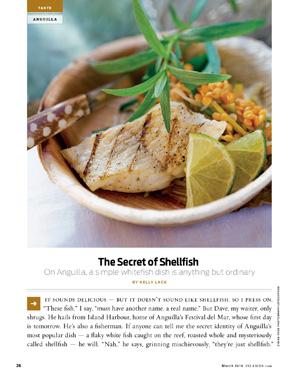Taste: Anguilla's Shellfish
It sounds delicious — but it doesn't sound like shellfish. so I press on. "These fish," I say, "must have another name, a real name." But Dave, my waiter, only shrugs. He hails from Island Harbour, home of Anguilla's Festival del Mar, whose first day is tomorrow. He's also a fisherman. If anyone can tell me the secret identity of Anguilla's most popular dish — a flaky white fish caught on the reef, roasted whole and mysteriously called shellfish — he will. "Nah," he says, grinning mischievously, "they're just shellfish."
To most of us, shellfish means crustacean — arthropods with luscious meat extracted in big chunks with tiny forks and submerged in drawn butter. But this, I'd discovered a day or so before meeting Dave, isn't the case on Anguilla. Because to truly understand Anguilla is to know that religion, specifically Christianity, guides much of life here. Alongside the glorious beaches, fishing villages and funky bars are around two dozen churches, an assortment of faith-based radio programs and sundry biblical prohibitions. So it is for religious reasons that many Anguillans refuse to consume that which you and I consider shellfish — crabs, lobsters, shrimp. They just sell it to tourists. Many also abstain from even the occasional alcoholic beverage.
Still, every time I asked someone what that one beloved dish was, that local specialty you can't live without, the answer was the same: something called shellfish. I was confused. If Anguillans don't eat lobster, what was this shellfish they loved so much?
It was Accelyn, my taxi driver and unofficial guide, who first realized my mistake. Having not yet seen one, I still believed that their shellfish were crustaceans. He told me, "Anything without scales is considered a scavenger." He clarified that shellfish in Anguilla-speak are actually small reef-dwelling fish with tasty white flesh and hard, shell-like skins. Fishermen, I was told, were the first to appreciate this supreme delicacy. After rowing their small wooden boats out into the early morning waters to "pull fish pots," they return with the day's catch for market, plus their own breakfasts: shellfish flavored only with ocean water and smoke from the driftwood fire over which they roast. These are eaten with johnnycakes from home and rum, coffee or bush tea. But, like my waiter Dave, Accelyn didn't know what the fish were actually called. "Shellfish" is his final answer.
So when we head to Anguilla's annual Festival del Mar the next day, I don't really know what it is I'm looking for. The beachfront shindig is right past Smitty's gas station in Island Harbour, a village of around 1,000 people, mostly fishermen and Seventh-Day Adventists; some are both. The festival feels like a neighborhood block party, and on a Caribbean island of only 16 by 3 ½ miles, a block party can include pretty much everybody. This one does. A waitress I'd had a few nights ago cheers on her brother during the boat races; Elvis, the owner of Elvis' Beach Bar, cruises through the crowd, foreign girlfriend in tow; and Dave from Dune Preserve holes up at the bar.
Accelyn and I troop all over that festival inquiring about shellfish, for he loves them dearly too. One stand hawks octopus, another flying fish. We find a lady ladling out tomato-based shellfish stew, but we really want the shellfish roasted whole. Of course, to her they're simply called shellfish. I console myself with beer, mahimahi steaks and watching the fishing boats return during the competition. One fisherman water skis fully clothed back to shore behind his boat. ("Oh, that Roger. Showoff. He got him a good catch to be sure.") And indeed, the scales declare Roger the victor. We decide the festival deserves a second chance the next day.
On Sunday, it happens: a breakthrough thanks to Seventh-Day Adventists. Violet, a fisherman's wife and family matriarch, is overseeing a stand on a small hill overlooking the ocean. Food is served out front, and sort of hidden around the back is a bar. This setup apparently allows the preacher to sit comfortably for a meal without being accosted by the devil's temptations. Violet has shellfish. Roasted whole. She has saved them for Sunday, the busier day, because the local Seventh-Day Adventists spend Saturdays giving praise, and church folk deserve a good meal as much as anybody.
While my fish roast, I watch Violet prep others. She splits them down the middle, mixes the meat with onions, peppers, garlic, salt and black pepper, and then returns it to the casing of the fish's exoskeleton. Hers is a more culinary take, but I can see how, to fishermen, the ease of grilling a whole, unprepped fish would possess enormous appeal. When served to us, the fishes' "shells" are toasty from the fire. The flesh, a pure white, is mild, moist and pleasantly flaky; the seasoning adds a Creole tang. Accelyn and I eat two each. I'm exuberant, satiated. Ah, a fisherman's fish in a fisherman's town on a fisherman's island. And, you know, after all that, I never even knew its real name.
